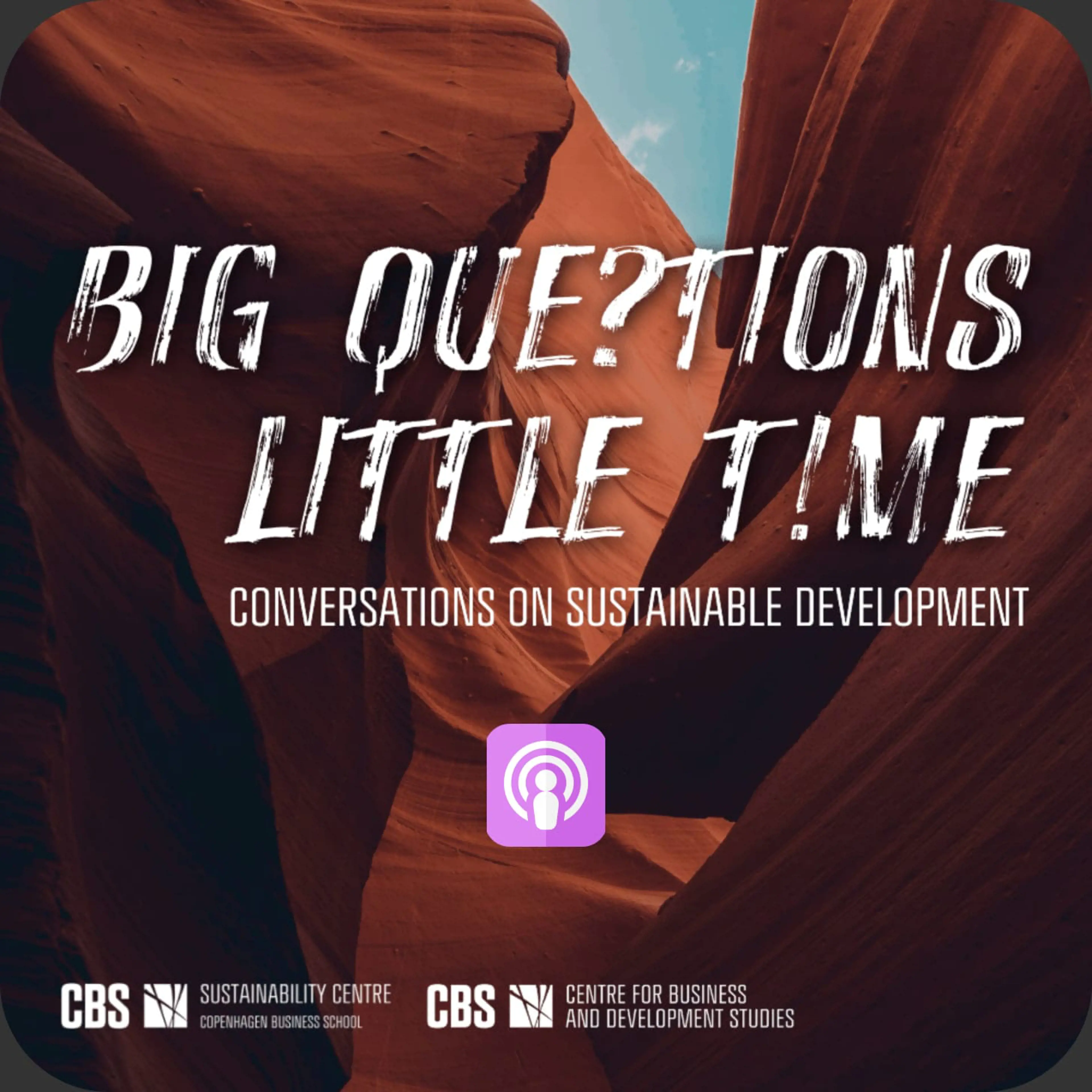Even the changes themselves change. Therefore, public leaders must learn to manage the unpredictable and the unknown. It is the backdrop for understanding the great task that managers face in the efforts for a more sustainable society, believes Christa Breum Amhøj, who has been researching public management for 15 years. She is also a supervisor for master's projects at MPG and an external lecturer at CBS.
"The societal diagnosis is relevant to understanding the sustainability agenda. We are in a time that consists of extreme crises and changes – for example, Covid, floods, mega-fires and climate refugees. Change management is the previously unrecognised expression of a leader who had to change some things in an organisation with a new concept or a new strategy. But the changes now come from 1000 places, and the manager must understand how to handle the unpredictable changes. A new, important term for what has become could lead to what is emerging," says Christa BreumAmhøj.
The climate issue points to a number of managerial challenges, she believes. One of them deals with the reconceptualisation of responsibility.
Christa Breum Amhøj refers to MPG lecturer and professor Niels Åkerstrøm, who has described how, in the 1980s and 90s, people moved away from understanding public organisations as rights-based organisations, where welfare management, for example, was about training the responsible employees, which ensured the same rights for all citizens, and an understanding of public organisations based on a service discourse. Here, employees must take responsibility for creating the service that top management has defined in advance.
"The extreme crises we are experiencing now, and including the sustainability issue, mean that leaders must create an ecosystem of actors who take responsibility for, yes, the planet. We must not only have responsibility or take responsibility within the organisation's boundaries. Suppliers, business partners and volunteers must also take responsibility for the task when it comes to managing sustainable organisations. It is the task - and not the formal organisation - that must set the team. It's about creating and leading a collective responsibility," says Christa Breum Amhøj.
Public leaders must strengthen their sense of the future
Leading the unpredictable is about being open to thousands of impressions and remaining in the ambiguous without immediately wanting to find a known, simple solution, believes MPG supervisor Christa Breum Amhøj.
Kontakt"Being able to manage the unpredictable is about being open to thousands of impressions. It's about being able to be ambiguous without immediately wanting to find a known, simple solution."
Christa Breum Amhøj, MPG supervisor
According to her, it's about working from a mindset that my task is also your task. Seeing the lines of connection across roles, silos and boundaries. If I solve a task in one place, it has significance in another place. However, it raises a number of managerial issues, she points out, and gives an example from Australia, which was recently hit by very extensive fires.
"People demonstrated and wanted the Prime Minister to act. But he had unconditional confidence in the existing preparedness and control system. He did not listen at all to the peripheral voices outside the system, which offered alternative solutions. If he had started listening, he might have realised that the fires could also be seen as a systemic issue. That our own system and our instrumental rationality fall short in our way of optimising nature," she says and continues:
"Leaders must dare to have a sense of the future and open up to forms of knowledge and the qualities that lie beyond the systems. Because this is where there is an opportunity to seize the unpredictable and create value. Being able to manage the unpredictable is about being open to thousands of impressions. It's about knowing the ambiguous without immediately wanting to find a known, simple solution."
It is also about a new form of trust in the unknown, believes Christa Breum Amhøj:
"If the Prime Minister was to pave the way to multiply sustainable solutions through collective responsibility, it would have required an unconditional trust in civil society - and that we can community solutions along the way - and not just a trust in the system and in the known."
Find a way out of the maze of problems
According to Christa Breum Amhøj, many of today's problems are so complex that they cannot be solved within existing control systems:
"Sustainability is about rethinking the instrumental rationality that has helped create the problems we have today. Some call it a problem maze. We cannot only reflect on it. We need to think and act differently, and we need to go beyond our formal role and participate as human beings.”
According to Christa Breum Amhøj, an important point is: Developing a sense of the future that can grasp what is arising and is on the way, and to open oneself to impressions from many places and from often peripheral voices, does not mean that one should not look for. You have to manage the place in new and more creative ways, including facilitating people meeting across roles, silos and boundaries. Public managers go from rationally leading organisations to also being able to lead ecosystems through creative and experimental methods, she explains:
"Hierarchies can shift in this way of working. You work much more horizontally and go on the edge of the formal organisation. It is not an either or, but a both and," she says.
It's also about new ways of understanding power, points out Christa Breum Amhøj and refers to a concept of the power triangle: When it comes to, for example, the sustainable agenda, it's not just about formal power, where you have power over others. Or about the personal and the discursive power, where one either uses situ formal leadership or one's ability to verbalize one's leadership book to create narratives. It is also about being able to relate to specific places, cities and nature. One day it could be water floods, the next mega-fire or it could be a virus.
"We must learn that we are connected to these non-human actors - and that they can also have power over us. If anything, Covid has taught us that. With the French sociologist Bruno Latour, you can say that we all need earthly leadership, where we give each other the power to create better welfare - and yes to create and secure life on the planet," says Christa Breum Amhøj.
From ego to eco
Mobilising and leading people, species and places over which you have no formal leadership becomes a realisation that many public leaders will come to terms with when it comes to sustainability.
"It's no longer just about my career, my team or my organisation's success. And in reality, it's the expansion management room," points out Christa Breum Amhøj.
"We must think holistically, well-informed ethics means that we can find one solution."
MPG supervisor Christa Breum Amhøj
In terms of management, she believes that we must move away from "ego to eco". From a responsibility that is about ensuring that the individual can perform. To think about how I can contribute to the shared ecosystem. The leadership role becomes a humility towards the fact that we are part of something bigger. The successful organisations of the future are those that can create value for the entire ecosystem and thereby create value on multiple bottom lines, she asserts:
"The managerial task is not only to lead others to lead themselves - self-leadership - but also to create space to mobilize communities, who in the process take responsibility for each other, cities and nature. The development from management of self-management to management of ecosystems cannot be guided by rules, expectations, routines, KPIs or self-development methods. It therefore calls for leaders to start experimenting with how they can create emotional relationships where people make a difference together. Leaders must be able to create the collective care and thus the psychological security that makes it possible for us across borders to sharpen our vision for the future in a world without a fixed horizon."
Having a sense of the future is not only about being able to see the dangers before they appear. It is also about being able to act on the unpredictable changes in creative ways and together with others, explains Christa Breum Amhøj.
It takes courage to act on one's sense of the future
She has observed a first and a second wave in the work for a more sustainable society. First came the CSR function, which subsequently became an isolated staff function. Now we see another wave, where sustainability becomes a management task for all public organisations.
"We must think holistically, well-informed ethics means that we can find one solution," she says.
Therefore, she also sees a challenge in the way in which some public organisations have implemented the UN's Global Goals.
"Goals about health have been placed in the health administration. Environmental targets have ended up in engineering and environmental management, and we have changed the targets to New Public Management targets, so I can check them off. It is a fine start, but in each and every task, now and in the future, we must deal with all goals. We must work more with the goals from a governance perspective in order to succeed," says Christa Breum Amhøj.
Analysis of wastewater for coronavirus is an example of how disaster management fosters fresh thinking and innovation across silos. Here, health becomes more than just a task for the health authorities
"Health is also about the waterworks, which can track viruses, and that it is a shared responsibility to create health," she points out.
Christa Breum Amhøj believes that courses at MPG can contribute to achieving the vision of working for a sustainable society with a governance perspective in mind:
"What can seem so big and abstract can be made concrete through teaching and discussions with teachers and other participants. And assignments during training lend themselves to experimentation in one's own practice and to testing new and more sustainable ways of doing things. The public sector is on its way, and when I look at all the many master's participants I have mentored, they are responsive to the changes taking place."
One challenge is the fear that the formal organisation will read off some leader who does not know the rules of the game, because the task is and will be to mobilize other types of forces that go on the edge of what is known.
“Sustainability is a serious task. However, we must not let go of the creative, the playful and the experimental. It is what should help us keep the bar high when it is difficult, and what should make us get out of the maze of problems and find new solutions. The managerial strategy is therefore about becoming a professional, creative activist, and about enabling others to become the same. Therefore, it requires courage – and collective care – to act on one's sense of the future,” she says.



